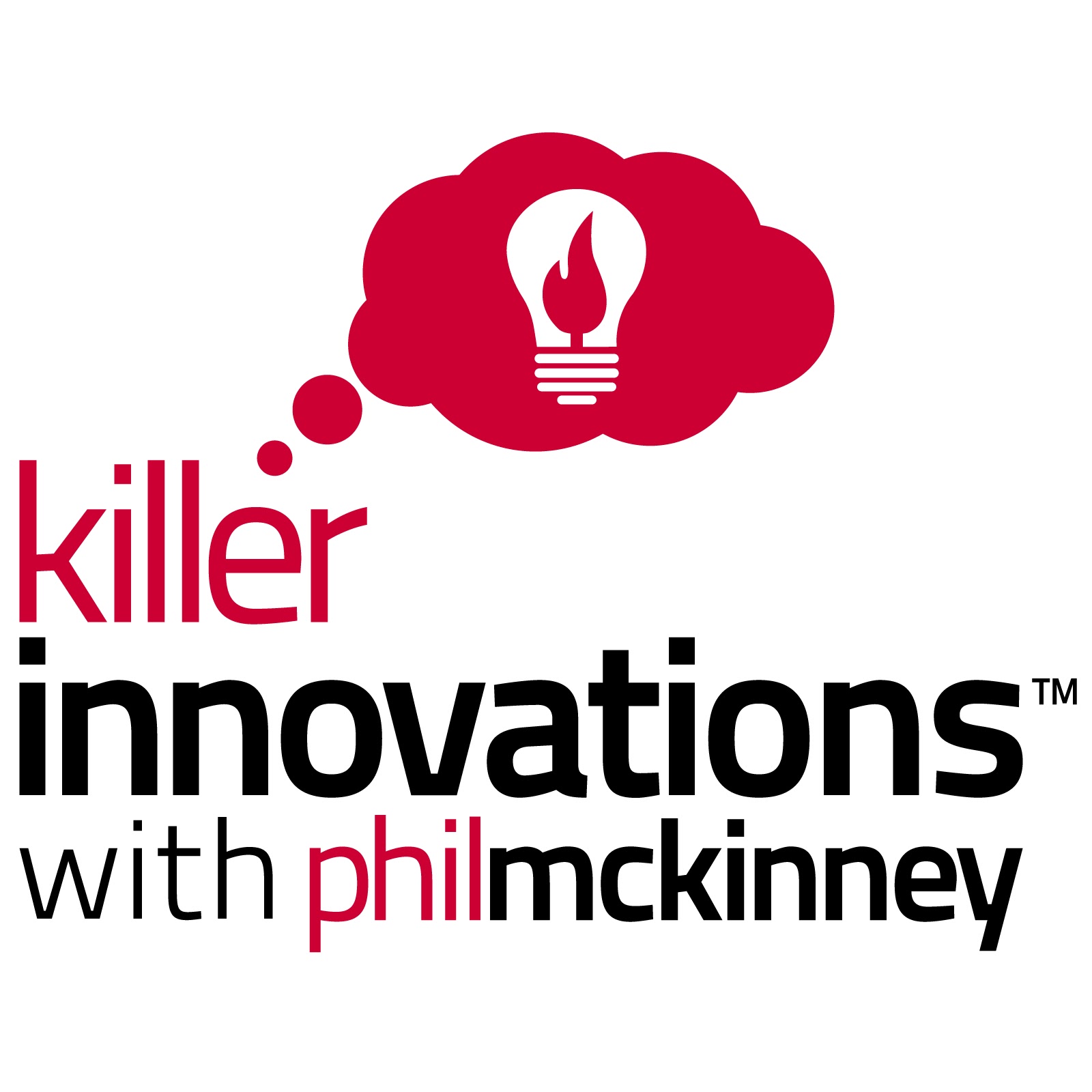

Killer Innovations with Phil McKinney - A Show About Ideas Creativity And Innovation
Phil McKinney
An award winning podcast and nationally syndicated radio show that looks at the innovations that are changing our lives and how their innovators used creativity and design to take their raw idea and create a game-changing product or service.
Episodes
Mentioned books

11 snips
Jan 14, 2026 • 12min
CES 2026: Battle of the AI Robots
At CES 2026 in Las Vegas, trends take center stage as Phil dives into the overwhelming presence of AI and robotics. From quirky AI toilets to autonomous lawn mowers, innovation is in full swing. The buzz around Micro LED technology brings excitement to the traditional electronics scene. Despite a slowdown in consumer EV interest, commercial adaptations are emerging. Notably, hybrid fire trucks and autonomous vehicles are revolutionizing industries, signaling a shift toward smarter integration of tech in everyday life.

6 snips
Dec 23, 2025 • 5min
Thinking 101: A Pause, A Reflection, And What Might Come Next
Reflecting on 21 years of podcasting, the host discusses the surprising resonance of the Thinking 101 series. The emergence of AI has made independent thinking not just valuable, but essential for survival. Listeners are encouraged to contribute topics for future discussions. There's a focus on building thinking toolkits to navigate decision-making under stress. The host also invites engagement through comments, highlighting the shift in how personal reflection is valued today. A break for the holidays is noted, with plans for a return in January.

20 snips
Dec 16, 2025 • 17min
Mental Models — Your Thinking Toolkit
Discover how NASA's management and engineers reached drastically different risk assessments about the Challenger disaster using contrasting mental frameworks. Dive into the definition of mental models and their crucial role in decision-making. Learn three powerful tools to enhance your thinking: understanding that a map is not reality, applying inversion to identify risks, and conducting pre-mortems to boost problem detection. Gain practical tips for integrating these models into your decision-making process and unlock a new level of clarity in your judgments.

8 snips
Dec 2, 2025 • 17min
Numerical Thinking: How to Find the Truth When Numbers Lie
Explore how our intuition often misjudges risks, like fearing sharks over heart disease. Discover alarming statistics on collapsing numeracy skills and why they matter. Phil breaks down big numbers to help visualize their scale, shedding light on misleading percentages used by marketers. Learn to spot statistical lies with examples like the '4 out of 5 dentists' claim. Equip yourself with quick tactics to detect BS and apply systematic techniques to discern truth in news. It's time to empower yourself against manipulation!

8 snips
Nov 26, 2025 • 12min
The Clock is Screaming (And My Grandson is Listening)
The host shares a harrowing personal tale of multiple cardiac surgeries within a year, dramatically altering his perspective on gratitude. He confronts mortality head-on, realizing that traditional expressions of thankfulness feel empty under dire circumstances. A poignant lunch with his grandson prompts reflections on legacy and what truly matters in life. Finally, he encourages listeners to find meaning in pain, aiming to inspire others through his journey.

9 snips
Nov 11, 2025 • 23min
Second-Order Thinking: How to Stop Your Decisions From Creating Bigger Problems
A Polish study reveals that doctors lose detection skills after relying on AI, highlighting the hidden costs of quick fixes. Poor decisions can drain company profits significantly, showing the need for second-order thinking. By asking 'And then what?', individuals can map consequences and understand stakeholder reactions, crucial for avoiding unseen outcomes. Phil outlines strategies to navigate complexities, including a daily drill to enhance decision-making. Embracing this approach promises smarter, more foresighted choices in both personal and professional contexts.

18 snips
Nov 4, 2025 • 23min
How To Make Better Decisions When Nothing Is Certain
Feeling paralyzed by uncertainty? Discover how professionals like poker players and military strategists make better decisions by thinking in probabilities. Learn to replace certainty with ranges and how to update your beliefs as new information comes in. Phil shares how to use expected value for decision-making and the importance of a forecasting journal to hone your instincts. He reflects on personal experiences that highlight the power of probabilistic thinking, taking you from indecision to confident action.

14 snips
Oct 28, 2025 • 27min
You Think in Analogies Every Day (And You’re Doing It Wrong)
Explore the fascinating world of analogical thinking and how it shapes our understanding every day. Discover why your brain relies on familiar comparisons to grasp new concepts. Learn how the quality of analogies can influence learning outcomes and even business strategies. Phil also dives into the risks of flawed analogies, shares techniques for creating effective comparisons, and outlines the benefits of mastering this skill. Gain insight into how great innovators use analogies to reframe ideas and drive success.

9 snips
Oct 21, 2025 • 25min
How To Master Causal Thinking
Explore the staggering $37 billion lost annually due to misattributed marketing results. Learn the critical distinction between correlation and causation that derails careers. Discover three essential tests for true causation and practical strategies to challenge causal claims quickly. Delve into mental shortcuts and biases that lead to errors in judgment. Master a five-question causation check and a six-step process for effective causal analysis, empowering you to be a trusted decision-maker and avoid costly mistakes.

10 snips
Oct 14, 2025 • 29min
How To Improve Your Logical Reasoning Skills
Dive into the fascinating world of logical reasoning! Learn how muddling correlation with causation can lead to misinformation. Discover the key differences between deductive and inductive reasoning, and why mixing them can harm your decision-making. Equip yourself with five powerful strategies to improve your reasoning skills, from labeling your thoughts to hunting for contradictions. Plus, tackle the Pattern Detective Challenge to sharpen your analytical skills. Get ready to make better decisions and navigate information with confidence!


